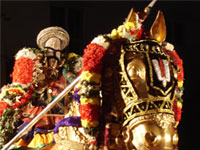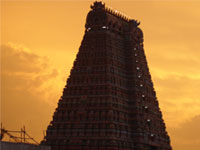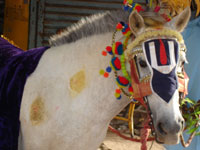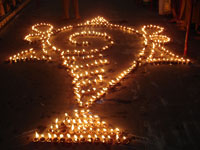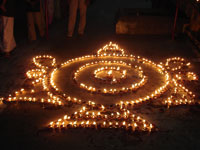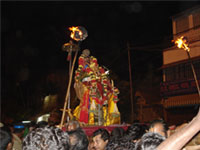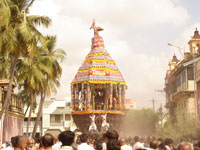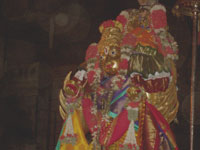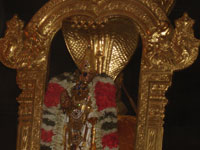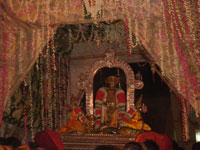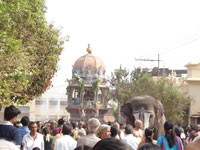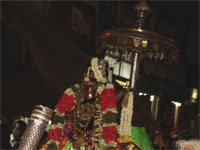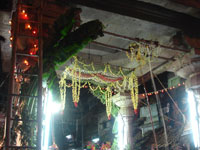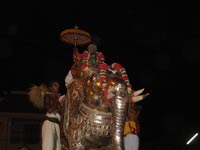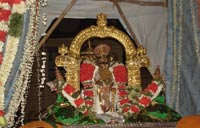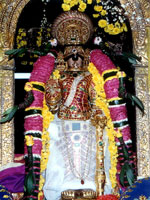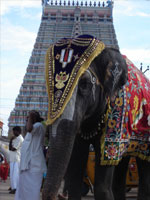Place of good things . . . If an egg is broken by an outside force, a life ends. If it breaks from within, a life begins. Great things always begin from within.
Tuesday, January 31, 2012
Lies
probably the most sophisticated animals when it comes to lying, and our
languages contain many words to describe variations of untruth. Here's a
roster of synonyms in English for referring to lies and similar
creations:
1. Bluff: a statement intended to deceive or confuse
2. Canard: an unsubstantiated story or report
3. Deceit: a deceptive statement
4. Deception: A statement or action intended to mislead
5. Distortion: a deviation from the true meaning, or an overstatement of proportion
6. Equivocation: a misleading or confusing statement based on the possibility of differing interpretations
7. Exaggeration: an overstatement or overemphasis
8. Fable:
a fictitious statement or story, in the sense of something made up to
explain or justify an unmerited action or state of affairs
9. Fabrication: a made-up fact or incident
10. Fairy tale: a misleading story, especially a simplistic one that would not be expected to deceive anyone
11. Fallacy: a deceptive
or erroneous statement; also, a false idea or a flawed argument
12. Falsehood: something untrue or inaccurate
13. Falsification: an alteration of facts in order to deceive
14. Falsity (see falsehood)
15. Fib: a simple, perhaps transparent lie
16. Fiction: an invented statement or story
17. Half-truth: a statement with some basis in truth that nevertheless serves to deceive
18. Humbug: a false, deceptive, or nonsensical statement
19. Invention: a statement crafted to deceive
20. Jive: a deceptive, insincere, or nonsensical statement
21. Libel: a written or similarly presented lie that defames a person
23. Mendacity: an act of lying
23. Misconception: a poor understanding, perhaps deliberate, of a fact
24.
Misinformation: a purported fact presented with the intent to deceive
25. Misinterpretation: a deviation from the facts or from a reasonable analysis of them
26. Misreport: an inaccurate account
27. Misrepresentation: an erroneous or unfair interpretation of facts
28. Misstatement: an inaccurate or erroneous comment
29. Myth: a perpetuated notion, belief, or tradition that is suspect or unfounded
30. Obliquity: a deviation from the truth to obscure or confuse
31. Perjury: a lie presented under oath
32. Pose: a false or deceptive position or self-representation
33. Pretense: an unsupported claim, an insincere purpose or intention, or a superficial effort
34. Prevarication: a deviation from the truth
35. Slander: an
injuriously false statement about a person
36. Story: a lie, or a rumor
37. Tale: a false representation
38. Taradiddle: nonsense (also, see fib)
39. Untruth: a deviation from truth or the facts
40. Whopper: an outsized lie=================
Monday, January 30, 2012
Bheeshmastami
Bheeshmastami
Magha Shudda Astami
This is the day on which Bheeshma did the dehatyaaga after being in the Shara panjara for many days.
We have to give Tarpana to Bheeshmaru :
ಗಂಗಾಪುತ್ರಾಯ ಭೀಷ್ಮಾಯ ಆಜನ್ಮಬ್ರಹ್ಮಚಾರಿಣೇ |
ಅಪುತ್ರಾಯ ಜಲಂ ದದ್ಯಾಂ ನಮೋ ಭೀಷ್ಮಾಯ ವರ್ಮಣೇ |
ಭೀಷ್ಮ: ಶಾಂತನವೋ ವೀರ: ಸತ್ಯವಾದೀ ಜಿತೇಂದ್ರಿಯ: |
ಆಭೀರದ್ಭಿರವಾಪ್ನೋತು ಪುತ್ರಪೌತ್ರೋಚಿತಾಂ ಕ್ರಿಯಾಮ್ |
ವೈಯಾಘ್ರಪಾದಗೋತ್ರಾಯ ಸಾಂಕೃತ್ಯಪ್ರವರಾಯ ಚ |
ಅಪುತ್ರಾಯ ದದಾಮ್ಯೇತಜ್ಜಲಂ ಭೀಷ್ಮಾಯ ವರ್ಮಿಣೇ |
ವಸೂನಾಮವತಾರಾಯ ಶಂತನೋರಾತ್ಮಜಾಯ ಚ |
गंगापुत्राय भीष्माय आजन्मब्रह्मचारिणे ।
अपुत्राय जलं दद्यां नमो भीष्माय वर्मणे ।
भीष्म: शांतनवो वीर: सत्यवादी जितेंद्रिय: ।
आभीरद्भिरवाप्नोतु पुत्रपौत्रोचितां क्रियाम् ।
वैयाघ्रपादगोत्राय सांकृत्यप्रवराय च ।
अपुत्राय ददाम्येतज्जलं भीष्माय वर्मिणे ।
वसूनामवताराय शंतनोरात्मजाय च ।
gangaaputraaya bhIShmaaya AjanmabrahmachaariNE |
aputraaya jalaM dadyaam namO bhIShmaaya varmaNE |
bhIShma: shaaMtanavO vIra: satyavaadI jitEndriya: |
AbhIradbhiravaapnOtu putrapoutrOchitaaM kriyaam |
vaiyaaGrapaadagOtraaya saankRutyapravaraaya cha |
aputraaya dadaamyEtajjalam bhIShmaaya varmiNE |
vasUnaamavataaraaya shantanOraatmajaaya cha |
Dantadhavanam
Dantadhavanam !
- Vaikankat , coconut and kashmari tree twigs when used for tooth brushing increases BRAMHI DYUTI [ bramhinical light ]
- Kshem tree gives a beautiful and intelligent ,chaste wife
- Vata vruksha gives lots of money
- Arka [ aak ] increases the TEJ [ the spiritual radiance ]
- Madhu vryksha gives brith of child
- Arjun tree gives ability that makes one lovable among the surrounding people
- Shirish tree and Karanja tree if used for brushing teeth brings in wealth
- Plaksh tree gives fulfillment of all desires
- Chameli if used for brushing teeth gives lot of respect in the vicinity
- Peepal tree will give leadership qualities
- Badari and Brihati [ Ber [ berries ] and kateri ] gives health and relief from diseases and increase in longevity
- Khadir and Bel gives enormous prosperity
- Tanye tree [ tenduva tennesse] and Kadamba tree gives obtainment of all the desired articles
- Neem increases the finances
- Karveerand Bhandeer tree gives gain of grains
- Shami tree gives victory over enemies
- Arjun tree gives capability to wipe out enemies
- Shyama tree enables to kill enemies
- Shaal and Ashvakarna tree brings in laurels and awards
- Devadaru and Vaasika tree gives honours and medals
- Priyangu , Apaamaarga , Jaamun and Daalinmba tree gives enormous attraction to the personality whereby everyone adores …
- One must brush tree in the east or north direction
- After brushing one must wash and leave the remains of the twig in a neat place and not throw in dust bin … the place where twig is thrown should be pavitra
- If while dropping the twig the eaten part falls in the eastern or northern direction one will get auspicious results or stands still firm upwards ….one will get very auspicious results
- If it stands firm and falls down then one would get sumptous meal that day ..
- Take plenty of twigs 12 inches in size
- Mix Haritaki powder in Gomutra [ cows urine ]
- soak the twigs in this mixture for seven days
- Take elaichi , daalchini gandhapatra , sauveer ,honey , kalimirchi , naagkesar and kooth in equal parts and mix it in water to amke a gandhodaka
- soak the twigs for several days in this mixture
- Take jayphal 4 parts
- gandhapatra 2 parts
- elaichi 1 part
- Karpur 3 parts
- make a powder
- Apply this powder to the twigs
- happy disposition
- Excellent radiance in face
- Clean mouth
- Fragrant oral aura
- and perfumed speech output
- and pleasnt to ears VOICE
Krishnarpanamastu
TWO DIFFICULT THINGS TO ACHIEVE
1. To plant your ideas in someone else's head.
2. To put someone else's money in your own pocket.
The one who succeeds in the first one is called a TEACHER.
And the second is called a BUSINESSMAN.
The one who succeeds in both is called a WIFE.
The one who fails in both is called a HUSBAND!!!
India - I bow
ब्रह्मराजर्षिररत्नाढ्यां वन्दे भारतमातरम् ॥
ratnAkaradhautapadAM himAlayakirITinIm |
brahmarAjarShiraratnADhyAM vande bhAratamAtaram ||
To her whose feet are washed by the ocean, who wears the Himalayas as her crown, and is adorned with the gems of rishis and kings, to Mother India, do I bow down in respect
Ratha Saptami – Maga Shudda Saptami
Ratha Saptami – Maga Shudda Saptami
What is Rathasaptami?
-
It is on this day that Surya rided the chariot to kill Mandeha named Daithya.
-
It is on this day that Vishwakarma prepared the Chariot for Rudradevaru to kill Tripurasura
-
The Sun Chariot has one wheel, seven horses, Aruna will be the sarathi, and on this Surya – tadantargatha Suryanarayana will be riding.
-
It was on Vaivaswatha Manvantara Maghamasa Saptami that Surya rided the chariot.
-
If on Magha Shudda saptami Bhanuvara (Sunday) falls it is termed as Vijaya Yoga and will have mahaphala.
-
If on Magha Shudda Saptami Bhanuvara and Revathi nakshatra falls, it is termed as Padmaka Yoga and is equal to Thousand Suryagrahana Maha parvakala.
-
If on Magha Shudda Saptami Surya moves to the next Rashi it is termed as Mahajaya and snaana, daana, tapassu, pitru tarpana will fetch more punya than any other day.
-
We have to do the snaana with seven saptarka parna ಎಕ್ಕದೆಲೆಗಳು
-
We have to do the naivedya of Ellu-bella (like Makarasankranthi)
Why sapta arka parNa ? ಎಕ್ಕದೆಲೆಗಳು -
"arka" is one among the names of Surya and "ekka" is the tadbhavashabda of arka. Surya or the sun god is the Arogya devadi – Arogyam bhaaskaraadichchEt. On Magha shudda saptami surya's rays which are roga nivaraka will fall on arka patra. That is why those who does the snaana on this day will have disease free body. Further the sins done in sapta janma also will be lost by just doing snaana of arka patre. We have to keep seven arka patraas one each on our head, both arms, two knees, two foots. We have to brush our body not from soaps but from these leaves only on this day. Due to this our skin diseases will be lost.
On this day we have to sketch the figure of Chariot with 7 horses in front of our Tulasi Vrundavana or in the devaramane and do the pooja of SuryanaaryaaNa
स्नान मंत्र -
यद्यज्जन्मकृतं पापं मया सप्तसु जन्मसु ।
तन्मे रोगं च शोकं च माकरी हंतु सप्तमी ।
एतज्जन्मकृतं पापं जच्च जन्मांतरार्जितं ।
मनोवाक्कायजं यच्च ज्ञाताज्ञातं च यत्पुन: ।
इति सप्तविधं पापं स्नानान्मे सप्त सप्तके ।
सप्तव्याधिसमायुक्तं हर माकरि सप्तमि ।
अर्घ्य मंत्र – to Surya
सप्तसप्तिवहप्रीत सप्तलोकप्रदीपन ।
सप्तमी सहितो देव गृहाणार्घ्यं दिवाकर ।
ಸ್ನಾನ ಮಂತ್ರ -
ಯದ್ಯಜ್ಜನ್ಮಕೃತಂ ಪಾಪಂ ಮಯಾ ಸಪ್ತಸು ಜನ್ಮಸು |
ತನ್ಮೇ ರೋಗಂ ಚ ಶೋಕಂ ಚ ಮಾಕರೀ ಹಂತು ಸಪ್ತಮೀ |
ಏತಜ್ಜನ್ಮಕೃತಂ ಪಾಪಂ ಜಚ್ಚ ಜನ್ಮಾಂತರಾರ್ಜಿತಂ |
ಮನೋವಾಕ್ಕಾಯಜಂ ಯಚ್ಚ ಜ್ಞಾತಾಜ್ಞಾತಂ ಚ ಯತ್ಪುನ: |
ಇತಿ ಸಪ್ತವಿಧಂ ಪಾಪಂ ಸ್ನಾನಾನ್ಮೇ ಸಪ್ತ ಸಪ್ತಕೇ |
ಸಪ್ತವ್ಯಾಧಿಸಮಾಯುಕ್ತಂ ಹರ ಮಾಕರಿ ಸಪ್ತಮಿ |
Surya ಅರ್ಘ್ಯ ಮಂತ್ರ -
ಸಪ್ತಸಪ್ತಿವಹಪ್ರೀತ ಸಪ್ತಲೋಕಪ್ರದೀಪನ |
ಸಪ್ತಮೀ ಸಹಿತೋ ದೇವ ಗೃಹಾಣಾರ್ಘ್ಯಂ ದಿವಾಕರ |
snaana mantra -
yadyajjanmakRutam paapam mayaa saptasu janmasu |
tanmE rOgam cha shOkam cha maakarI hantu saptamI |
EtajjanmakRutam paapam jachcha janmaantaraarjitam |
manOvaakkaayajam yachcha jnaataaj Jnaatam cha yatpuna: |
iti saptavidham paapam snaanaanmE sapta saptakE |
saptavyaadhisamaayuktam hara maakari saptami |
arGya mantra to Surya :
saptasaptivahaprIta saptalOkapradIpana |
saptamI sahitO dEva gRuhaaNaarGyam divaakara |
Kooshmaanda Daana – (ಬೂದಗುಂಬಳಕಾಯಿ)
On this day, we have to give daana of Kooshmaanda (ಬೂದಗುಂಬಳಕಾಯಿ) (pumpkin). By giving the kooshmandadana, we will be free from any garbha dosha and will have santaanaphala. mantra to be chanted while giving pumpkin daana -आचमन, केशवायस्वाह……… प्रणवस्य परब्रह्मऋषि: परमात्मादेवता., …………शुभेशोभन मुहूर्ते अद्यब्रह्मण: द्वितीयपरार्धे श्रीश्वेतवराहकल्पे वैवस्वत मन्वंतरे कलियुगे प्रथमपादे भरतवर्षे दंडकारण्ये गोदावर्या: दक्षिणेतीरे शालीवाहनशखे, बौद्धावतारे, रामक्षेत्रे/परशुरामक्षेत्रे, अस्मिन् वर्तमाने चांद्रमानेन श्री ___________ संवत्सरे, उत्तरायणे, शिशिरऋतौ, माघमासे, शुक्लपक्षे सप्तम्यां शुभतिथौ, रथसप्तमी प्रयुक्त, मम कुले सकल गर्भदोष परिहारारार्थं, सूर्यांतर्गत, भारतीरमण मुख्यप्राणांतर्गत, एतद् मास नियामक कमला माधव प्रीत्यर्थं, अस्मत् कुलदेवत श्रीलक्ष्मी नरसिंह/वेंकटेश प्रीत्यर्थं, कूष्मांड दानं करिष्ये.
कूष्मांडंतिलगव्याढ्यं ब्रह्मणा निर्मितं पुरा ।
यस्मादस्य प्रदानेन संततिर्वर्धतां मम ॥
ಆಚಮನ, ಕೇಶವಾಯಸ್ವಾಹ……… ಪ್ರಣವಸ್ಯ ಪರಬ್ರಹ್ಮಋಷಿ: ಪರಮಾತ್ಮಾ ದೇವತಾ., ……… ಶುಭೇಶೋಭನ ಮುಹೂರ್ತೇ ಅದ್ಯಬ್ರಹ್ಮಣ: ದ್ವಿತೀಯಪರಾರ್ಧೇ ಶ್ರೀಶ್ವೇತವರಾಹಕಲ್ಪೇ ವೈವಸ್ವತ ಮನ್ವಂತರೇ ಕಲಿಯುಗೇ ಪ್ರಥಮಪಾದೇ ಭರತವರ್ಷೇ ದಂಡಕಾರಣ್ಯೇ ಗೋದಾವರ್ಯಾ: ದಕ್ಷಿಣೇತೀರೇ ಶಾಲೀವಾಹನಶಖೇ, ಬೌದ್ಧಾವತಾರೇ, ರಾಮಕ್ಷೇತ್ರೇ/ಪರಶುರಾಮಕ್ಷೇತ್ರೇ, ಅಸ್ಮಿನ್ ವರ್ತಮಾನೇ ಚಾಂದ್ರಮಾನೇನ ಶ್ರೀ ___________ ಸಂವತ್ಸರೇ, ಉತ್ತರಾಯಣೇ, ಶಿಶಿರಋತೌ, ಮಾಘಮಾಸೇ, ಶುಕ್ಲಪಕ್ಷೇ ಸಪ್ತಮ್ಯಾಂ ಶುಭತಿಥೌ, ರಥಸಪ್ತಮೀ ಪ್ರಯುಕ್ತ, ಮಮ ಕುಲೇ ಸಕಲ ಗರ್ಭದೋಷ ಪರಿಹಾರಾರಾರ್ಥಂ, ಸೂರ್ಯಾಂತರ್ಗತ, ಭಾರತೀರಮಣ ಮುಖ್ಯಪ್ರಾಣಾಂತರ್ಗತ, ಏತದ್ ಮಾಸ ನಿಯಾಮಕ ಕಮಲಾ ಮಾಧವ ಪ್ರೀತ್ಯರ್ಥಂ, ಅಸ್ಮತ್ ಕುಲದೇವತ ಶ್ರೀಲಕ್ಷ್ಮೀ ನರಸಿಂಹ/ವೇಂಕಟೇಶ ಪ್ರೀತ್ಯರ್ಥಂ, ಕೂಷ್ಮಾಂಡ ದಾನಂ ಕರಿಷ್ಯೇ.
ಕೂಷ್ಮಾಂಡಂತಿಲಗವ್ಯಾಢ್ಯಂ ಬ್ರಹ್ಮಣಾ ನಿರ್ಮಿತಂ ಪುರಾ |
ಯಸ್ಮಾದಸ್ಯ ಪ್ರದಾನೇನ ಸಂತತಿರ್ವರ್ಧತಾಂ ಮಮ ||
Achamana, kEshavaaya svaaha…..praNavasya parabrahmaRuShi: paramaatmaa dEvataa., …… shubhEshObhana muhUrtE adyabrahmaNa: dvitIyaparaardhE shrIshvEtavaraahakalpE vaivasvata manvantarE kaliyugE prathamapaadE bharatavarShE danDakaaraNyE gOdaavaryaa: dakShiNEtIrE shaalIvaahanashaKE, bouddhaavataarE, raamakShEtrE/ parashuraamakShEtrE, asmin vartamaanE chaandramaanEna shrI ___________ samvatsarE, uttaraayaNE, shishiraRutou, maaGamaasE, shuklapakShE saptamyaam shubhatithou, rathasaptamI prayukta, mama kulE sakala garbhadOSha parihaaraaraartham, sUryaantargata, bhaaratIramaNa muKyapraaNaantargata, Etad maasa niyaamaka kamalaa maadhava prItyartham, asmat kuladEvata shrIlakShmI narasimha/vEnkaTEsha prItyartham, kUShmaanDa daanam kariShyE.
kUShmaanDamtilagavyaaDhyam brahmaNaa nirmitam puraa |
yasmaadasya pradaanEna santatirvardhataam mama ||
(Source – Chaturvedi Vedavyasachar's book – Chaitraadi Maasa kartavyagalu) Friday, January 27, 2012
SahA nA vavatu
सहनौ भुनक्तु
सहविर्यम् करवावहे
तेजस्विना वधीतम् अस्तु
मा विद विशावहै
ऊं शांति शांति शांति
Om Sahana Vavatu Sahanau Bhunaktu
Sahaveeryam Karavavahai
Tejasvina vatitamastu ma vidhwishavahai
Om Shanti Shanti Shantihi
Sanskrit to English Word Meaning:
Saha- both;�nau-us;�avatu- may he protect;�bhunaktu-may he nourish;�viryam karavavahai-may we acquire the capacity;�tejasvi-be brilliant;�nau-for us;adhitam- what is studied;�astu-let it be;�ma vidvisavahai-may we not argue with each other.
Translation:
May He protect both of us. May He nourish both of us. May we both acquire the capacity (to study and understand the scriptures). May our study be brilliant. May we not argue with each other. Om peace, peace, peace.
Brief explanation:
At the beginning of a class, the teacher and students generally recite this peace invocation together. Both seek the Lord's blessings for study that is free of obstacles, such as poor memory, or the inability to concentrate or poor health. They also seek blessings for a conducive relationship, without which communication of any subject matter is difficult. Therefore, this prayer is important for both the teacher and the student.
கைமேல் பலன் தரும் நரசிம்ம பிரபத்தி
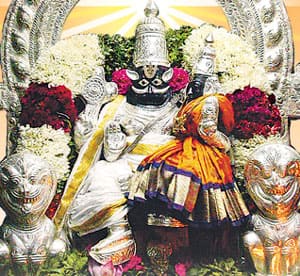
அதில்,""ஒருவன் தவறாமல் முன்னோர் வழிபாடு செய்யாவிட்டால் அவனை துன்பம் விரட்டும். இது தவிர, தெய்வ நிந்தனை செய்வது, ஒற்றுமையாக இருக்கும் கணவன் மனைவியைப் பிரிப்பது, கோள் சொல்லி குடும்ப ஒற்றுமையைக் குலைப்பது, வாயில்லா ஜீவன்களைத் துன்புறுத்துவது போன்ற பாவங்களை எந்தப் பிறவியில் செய்திருந்தாலும், அது விரட்டி வந்து துன்பத்தைத் தரும்,'' என்று சொல்லியிருக்கிறார்.
ஆனால், பாவம் செய்யாத மனிதர் யார் இருக்கிறார்கள்? ஏதோ, ஒரு பாவத்தை செய்து தொலைத்ததால் தான், இப்போது கஷ்டம் நம்மை வாட்டுகிறது. இவ்வாறு, அறிந்தோ அறியாமலோ செய்த பாவங்களால், கிடைத்து வரும் தண்டனையில் இருந்து விடுபட லட்சுமி நரசிம்மரை வழிபட வேண்டும். "பக்திக்கு மிஞ்சிய பரிகாரம் இல்லை' என்ற முழுமையான நம்பிக்கையுடன், நரசிம்மரின் திருவடிகளில் சரணாகதி அடைவது, தண்டனையில் இருந்து விடுதலை தரும்.
தன்னை நம்பிச் சரணடைந்தவர் யாராக இருந்தாலும், அந்த விநாடியே ஏற்று அருளும் தாயுள்ளம் படைத்தவர் அவர். அவரது படத்தை, பூஜை அறையில் கிழக்கு நோக்கி வையுங்கள்.
தினமும் நீராடிய பின், "நரசிம்ம பிரபத்தி' ஸ்லோகத்தை 3,12,24,48 என உங்களுக்கு வசதிப்படும் அளவுக்கு பாராயணம் செய்யுங்கள்.
அஹோபில மடத்தின் 44வது பட்டமாக வீற்றிருந்த அழகிய சிங்கர் முக்கூர் சுவாமிகளால் அருளப்பட்ட மந்திரம் இது. இந்த ஸ்லோகத்தைச் சொல்லும்போது, லட்சுமி நரசிம்மரின் முன் விளக்கேற்றி, காய்ச்சி ஆற வைத்த பசும்பால் அல்லது பானகம் நைவேத்யம் செய்ய வேண்டும். இப்பிரசாதத்தை குடும்பத்தினர் அனைவரும் சாப்பிட்டு வரவேண்டும். கைமேல் பலனளிக்கும் சக்தி வாய்ந்த ஸ்லோகம் இது. 48 நாட்களுக்குள் எண்ணிய செயல் கைகூடியபின் நரசிம்மர் கோயிலில் சுவாமிக்கு நெய்தீபம் ஏற்றி துளசிமாலை சாத்தி வழிபட வேண்டும். கடன், நோய், திருமணத்தடை, குழந்தை பாக்கியம், வேலை வாய்ப்பு, வேலையில் இடைஞ்சல் இன்னும் எந்த வித கோரிக்கைக்காகவும் இந்த பிரபத்தியைச் சொல்லலாம்.
பால், பானகம் வைக்க வசதிப்படாதவர்கள் தண்ணீரை வைத்தாலே போதும். நரசிம்மர் மனம் உவந்து ஏற்பார்.
மாதா ந்ருஸிம்ஹ: பிதா ந்ருஸிம்ஹ:
ப்ராதா ந்ருஸிம்ஹ: ஸகா ந்ருஸிம்ஹ:
வித்யா ந்ருஸிம்ஹ: த்ரவிணம் ந்ருஸிம்ஹ:
ஸ்வாமி ந்ருஸிம்ஹ: ஸகலம் ந்ருஸிம்ஹ:
இதோ ந்ருஸிம்ஹ: பரதோ ந்ருஸிம்ஹ:
யதோ யதோ யாஹி: ததோ ந்ருஸிம்ஹ:
ந்ருஸிம்ஹ தேவாத் பரோ நகஸ்சித்:
தஸ்மான் ந்ருஸிம்ஹ சரணம் ப்ரபத்யே.
சமஸ்கிருதத்தில் சொல்ல முடியாதவர்கள், இந்த தமிழாக்கத்தைப் படிக்கவும்.
நரசிம்மரே தாய், நரசிம்மரே தந்தை.
சகோதரனும் நரசிம்மரே தோழனும் நரசிம்மரே!
அறிவும் நரசிம்மரே செல்வமும் நரசிம்மரே!
எஜமானனும் நரசிம்மரே எல்லாமும் நரசிம்மரே!
இவ்வுலகத்திலும் நரசிம்மரே! அவ்வுலகத்திலும் நரசிம்மரே!
எங்கெங்கு செல்கிறாயோ அங்கெல்லாம் நரசிம்மரே!
நரசிம்மரைக் காட்டிலும் உயர்ந்தவர் எவரும் இல்லை
அதனால், நரசிம்மரே! உம்மைச் சரணடைகிறேன்.
Tuesday, January 24, 2012
Single sloka on Shiva & Vishnu
An amazing feat of this shloka is that it is about Shiva when read as such. When the first syllable of each word is removed, it adores ViShNu!
An overall and phrasal meanings related to Shiva and ViShNu, have been attempted using what is found @ (http://sa.wiktionary.org/wiki/)
gavIshapatro nagajArtihArI kumAratAtaH shashikhaNDamauliH |
la~gkeshasampUjitapAdapadmaH pAyAdanAdiH parameshvaro naH ||
गवीशपत्रो नगजार्तिहारी कुमारतातः शशिखन्डमौलिः ।
लङ्केशसम्पूजितपादपद्मः पायादनादिः परमेश्वरो नः ॥
Adoring Shiva:
May he protect us whose vehicle is the bull, who is the remover of the sorrow of Goddess PArvatI, who is the father of Skanda, who wears a moon on the head, whose lotus feet RAvaNa, the Lord of Lanka worshipped, who is beginningless and he who is the Supreme Lord.
padArtha--phrasal meanings:
gavIshapatro: patra--vehicle, gavIsha--of the cow kine
nagajArtihArI: nagaja--mountain-born, so PArvati; arti--pain; harI--remover
kumAratAtaH: tAtaH--father, of kumAra--Skanda
shashikhanDamauliH: shashi-khaNa--piece of moon, so crescent moon; mauli--head
la~gkeshasampUjitapAdapadmaH: la~gkesha--Lord of Lanka, so RAvaNa; sampUjita--greately honoured; pAdapadmaH--lotus feet
pAyAdanAdiH = pAyAt (from water ?) + anAdih (beginning less)
parameshvara: Supreme Lord.
Adoring ViShNu:
May he protect us whose bed is the poisonous snake, who is the remover of the sorrow of Goddess LakShmI, mAratAtaH (meaning?), who wears a peacock feather on the head, who is the ViShNu, greatly honoured, with lotus feet, yAdanAdiH--of the lineage of the YAdavas, and who is the Lord of RamA--LakShmI.
padArtha--phrasal meanings:
vIshapatro: visha--poison, so the Snake; patra--sheet, bed
gajArtihArI: Gaj (elephant) + aarti (pain) + haari (remover) ====> who is the remover of pain of the elephant (refer the story of elephant & the crocodile).
mAratAtaH: mAra ( obstacles) + Taatah ( father or any respectable elder ... but might have been used poetically ... a guess)
shikhaNDamauliH: shikhaNDa--crest or plume as of the peacock's tail, lock of hair; mauli--head
keshasampUjitapAdapadmaH: kesha--ViShNu; sampUjita--greatly honoured; pAdapadmaH--lotus feet
yAdanAdiH: of the YAdava clan, lineage? OR YAdan (Yaadvas, just a guess) + Adih ( the first "among")
rameshvara: ramA--LakShmI; Ishvara--Lord; so Lord of Goddess LakShmI
Snake
कर्तव्या महती फणा /
Whether the snake has poison or not
it should display its ferrocious hood.
Monday, January 23, 2012
Discretion
*A story from Pananchatantram of Vishnusharma.*
* *
* A fox named Mahaachathuraka lived in a forest. For him food was scarce
and he was roaming aimlessly in search of something to fill his tummy. As
if by great fortune, he came across the carcass of a dead elephant.. He ran
around it jubilantly but knew he could not eat any meat unless the thick
hide covering the body of the elephant was cut open by another beast. As
he was pondering ways and means to satiate his hunger, a lion also came
there from nowhere. Immediately on seeing the lion, the fox became all
humility.
*
* With affected socicitousness, he said, " My Lord, Victory to you. I saw
this dead elephant a few hours ago, and just from that moment I was
standing guard for your Majesty to arrive and have his Royal Dinner.. Please
permit me to have the honour of offering this hospitality to your Majesty".
*
* With these words the fox prostrated himself before the lion.
*
*Seeing the silly fox and his sillier gestures, the lion said. " You fool,
do not you know that I never eat the flesh of any animal which I have not
killed myself? A highborn like me will not eat the leftovers of others,
even at the cost of their lives. So I leave this food for you. You can
yourself eat to your heart's content."..
*
*This is what the fox expected. He thought. " It is befitting of a
blue-blooded aristocrat. Noble men do not let go of their purity at any
time. The conch will remain shiningly white even if it put in fire" *
*A tiger came that way immediately after the lion left.
*
*The fox thought. " I could manage to send off the lion by playing upon his
vanity and sense of superiority. The tiger is a cruel and crude
fellow. Flattery
will have no impact on him. I can only use mild deceit on him to keep him
away from my food. A fellow who cannot be befriended with nice words or by
gift can definitely be won over by deceit.
*
*
*
*Having thought like this, the fox addressed the tiger in a affected tone of
a well-wisher. " Uncle, why have you come here to jump into the mouth of
sure death? A lion has killed this elephant just a few minutes ago. He
has appointed me as a sentry to guard his food and has gone to the river to
have his Royal bath. His instructions are that if a tiger or some such mean
creature comes near his food, he should be informed immediately. I will
take care of him properly. I had a bitter experience of a dirty tiger once
desecrating my food by eating a part of it while I was away and ruining my
lunch. So next time any tiger comes anywhere near my food, it is sure death
for him".
*
*The tiger was frightened for his life. " Please my nephew, do not even
whisper a word to the lion. I want to live. I am off."
*
*Saying this he bolted. *
*
*
*The next visitor was a hyena.
*
*The fox thought. " This fellow has very sharp teeth. He can open the hide
of the elephant. One the hide is ripped open, the way for me is clear. It
is prudent to allow him also to eat some flesh because my purpose will be
served." Thinking thus, he told the hyena, " Oh my dear nephew, it is a
long time since I saw you. You look very thin and hungry. You are my dear
guest. Here, you see the body of an elephant killed by a lion. The lion is
off for his bath before having his supper. So you please can relish some
elephant flesh and go away before the lion comes."
*
* The hyena was reluctant. " Uncle, I really do not need the flesh of a dead
elephant. I can get hold of many living creatures to eat. I am of the view
that one should eat only what is easy to get, easy to eat , easy to digest
and nutritious to the body.. So I am off."
*
* The fox replied. " you coward, do not try to conceal your fear of the
lion by speaking generalities. Eat slowly. I shall warn you well in time
if the lion is on his way back."
*
*Thus reassured, the hyena sat for his dinner.. and immediately on seeing
that the hyena had broken the skin of the dead elephant, came the warning
of the fox, " Sonny, you bolt, the lion is back".. The hyena bolted leaving
no trace at all.
*
*The fox started eating with relish the flesh from the body of the elephant
pried open by the hyena. *
*The final visitor was another fox. This time the fox did not wait for any
tricks. He jumped straight on the adversary, attacked him with teeth and
nails, defeated him and lived on the food provided by the carcass of the
elephant for a very long time.*
*The lesson of the parable is that if the enemy is noble, surrender to him.
If he is stronger than you, defeat him through some deceitful act. If he is
lowly rascal, bribe him and get rid of him. And if the enemy is equal in
prowess, attack him and defeat him. *
--
If God brings you to it, He will bring you through it.
Happy moments, praise God.
Difficult moments, seek God.
Quiet moments, worship God.
Painful moments, trust God.
Every moment, thank God
Brahmavid-Ashirvada
Sri Vidyaranya's Brahmavid-Ashirvada
--
If God brings you to it, He will bring you through it.
Happy moments, praise God.
Difficult moments, seek God.
Quiet moments, worship God.
Painful moments, trust God.
Every moment, thank God
Sunday, January 22, 2012
Facebook addiction
Facebook addiction
The 76-year-old woman walked down the hallway of Clearview Addictions Clinic, searching for the right department. She passed signs for the "Heroin Addiction Department (HAD),"
the "Smoking Addiction Department (SAD)" and the "Bingo Addiction Department (BAD)."
Then she spotted the department she was looking for: "Facebook Addiction Department (FAD)."
It was the busiest department in the clinic, with about three dozen people filling the waiting room, most of them staring blankly into their Blackberries and iPhones. A middle-aged man with unkempt hair was pacing the room, muttering,"I need to milk my cows. I need to milk my cows."
A twenty-something man was prone on the floor, his face buried in his hands, while a curly-haired woman comforted him.
"Don't worry. It'll be all right."
"I just don't understand it. I thought my update was LOL-worthy, but none of my friends even clicked the 'like' button."
"How long has it been?"
"Almost five minutes. That's like five months in the real world."
The 76-year-old woman waited until her name was called, then followed the receptionist into the office of Alfred Zulu, Facebook Addiction Counselor.
"Please have a seat, Edna," he said with a warm smile. "And tell me how it all started."
"Well, it's all my grandson's fault. He sent me an invitation to join Facebook. I had never heard of Facebook before, but I thought it was something for me, because I usually have my face in a book."
"How soon were you hooked?"
"Faster than you can say 'create a profile.' I found myself on Facebook at least eight times each day -- and more times at night. Sometimes I'd wake up in the middle of the night to check it, just in case there was an update from one of my new friends in India . My husband didn't like that. He said that friendship is a precious thing and should never be outsourced."
"What do you like most about Facebook?"
"It makes me feel like I have a life. In the real world, I have only five or six friends, but on Facebook, I have 674. I'm even friends with Juan Carlos Montoya."
"Who's he?"
"I don't know, but he's got 4,000 friends, so he must be famous."
"Facebook has helped you make some connections, I see."
"Oh yes. I've even connected with some of the gals from high school -- I still call them 'gals.' I hadn't heard from some of them in ages, so it was exciting to look at their profiles and figure out who's retired, who's still working, and who's had some work done. I love browsing thei r photos and reading their updates. I know where they've been on vacation, which movies they've watched, and whether they hang their toilet paper over or under. I've also been playing a game with some of them."
"Let me guess. Farmville?"
"No, Mafia Wars. I'm a Hitman. No one messes with Edna."
"Wouldn't you rather meet some of your friends in person?"
"No, not really. It's so much easier on Facebook. We don't need to gussy ourselves up. We don't need to take baths or wear perfume or use mouthwash. That's the best thing about Facebook -- you can't smell anyone. Everyone is attractive, because everyone has picked a good profile pic. One of the gals is using a profile pic that was taken, I'm pretty certain, during the Eisenhower Administration. "
"What pic are you using?"
"Well, I spent five hours searching for a profile pic, but couldn't find one I really liked. So I decided to visit the local beauty salon."
"To make yourself look prettier?"
"No, to take a pic of one of the young ladies there. That's what I'm using."
"Didn't your friends notice that you look different?"
"Some of them did, but I just told them I've been doing lots of yoga."
"When did you realize that your Facebooking might be a problem?"
"I realized it last Sunday night, when I was on Facebook and saw a message on my wall from my husband: 'I moved out of the house five days ago. Just thought you should know.'"
"What did you do?"
"What else? I unfriended him of course!"
__._,_.___
Friday, January 20, 2012
Sriranganatha photoes
Manjunatheswar temple
Situated on the banks
of river Nethravathi and surrounded by the lush green forests and hills
of Malnad, Dharmasthala is known for it's beautiful surroundings and Sri
Manjunathaswamy Temple. In Dharmasthala, charity is a way of life, extended
to all without discrimination. Sri Dharmasthala which is one of the sacred
places in South India and is a famous pilgrim centre. It is situated in
the village of Dharmasthala, in Beltangady Taluk of South Kanara district
about 75 kms from Mangalore.�
Originally this place
was called Kuduma, it has rich history of over 800 years. The History of
this place says that, one day about 800 years ago, angels in the form of
human beings came to house of pious people, Barmana Heggade and his family.
The couple received the visitors with joy and respect. Impressed with the
hospitality and the treatment given by the family, the angels appeared
in their dream and promised to stay at Kuduma. They also ordered Barmana
Heggade to give donations and food for the needy everyday. As per the wish
of the angels Barmana Heggade built temples for Kalarahu,
Kalarkai, Kumarswamy and Kanyakumari and performed the rituals and
ceremonies from time to time.�
Entrance of Dharmasthala Temple Sometime later when Annappa Swamy,
the messenger of the angels brought Shivalingam from Kadri in Mangalore,
Heggade built a temple of Manjunatha Swamy and installed the Kadri's Shiva
Linga there.
Henceforth, several ceremonies were
held together for Manjunatha Swamy, Chandranatha
Swamy and the angels. Kuduma became Dharmasthala, the place where
Dharma is a way of life.�
Now Dharmasthala is beautiful city
with modern houses, magnificient buildings and tourist bungalows. There
are many educational institutions providing basic and higher educations.
Even after
several years, the Heggade family have continued to serve the place with
donations etc.�
Some of the prominent in the Heggade
dynasty are Kumarayya Heggade, Manjayya Heggade (the second), Chandayya
Heggade, Rathna Verma Heggade.�
Sri Manjunatheshwara Temple,
Dharmasthala
Lord Bahubali's Statue, Dharmasthala Temple Following the footsteps of his ancestors,
the present Dharmadhikari, Sri Veerendra Heggade has successfully accomplished
several revolutionary developmental projects. Soon after he took charge,
Sri Veerendra Heggade completed the installation of the 39 ft., 170 ton Bahubali in Dharmasthala.�
In 1982 the
Mahamasthakabhisheka of Bahubali was held in a grand fashion. It was an
important milestone in the history of Dharmasthala.�
The temple has Vaishnavite Archakas
and is administered by Heggade, a Jain Trustee. Charity is a way of life
here & is extended to all with no distinction of caste or creed. Thousands
throng the temple and every visitor is fed free of charge. During Laksha
Deepothsava, one lakh lamps are lit and literacy and religious discourses
are held.�
Free mass weddings which were started
in 1973 have gained popularity. It is a boon to those who cannot afford
weddings on their own. The Siddavana gurukula started by the Late Manjayya Heggade has become a model educational institution.�
Sri Kshetra is known for Annadhaana,
Vidyadhaana and Abhayadhaana. It is one of the few pilgrim centers which
provides free boarding and lodging to all the visitors. The exponentially
increasing number of visitors is a proof of the good work being done here.�
Sri Veerendra Heggade
Dharmasthala is also a famous educational
center. The educational trust of Sri Kshetra manages colleges in Ujjre,
Mangalore, Udupi among other places. The medical trust also provides services
to eradicate and prevent many diseases in local villages. The Dharmasthala
trust has also executed projects to provide basic
The Yakshagana group of the trust is
moving forward with the aim of popularising yakshagana through out the
country. Yakshagana training programme is held every year. There is also
a yoga training center. The monthly magazine Manjuvani publishes articles
of religous importance and local information.� ;
Dharmasthala: Tel: 91 8256 77141
Enquiry: 91 8256 77123
--
If God brings you to it, He will bring you through it.
Happy moments, praise God.
Difficult moments, seek God.
Quiet moments, worship God.
Painful moments, trust God.
Every moment, thank God
Thursday, January 19, 2012
Thai Amavasya/Vasant Panchami - Two Rare Stotras
aiyadikaL- kAdavarkOn-nAyanAr
His life history can be known in Tamil Audio/Video from the following link.
http://www.esnips.com/doc/ 72a42df9-8ce0-4db5-b1df- d8ae43818e71/45
aiyadikaL- kAdavarkOn-nAyanAr
One city that was renowned throughout India for its intellectuals, institutions and ingenious art work was kAnychi, the capital of the pallavAs. The king of the pallava land who conquered the excess of the kali and the enemies was aiyadikaL perumAnAr, the king who ruled the land with his upright royal stick of justice - the Justice of Lord shiva. With the wealth and fame, with every life in the land sitting pride and peaceful, with the poles of enmities won over and the justice prevailing, with the great shaivam spreading its fragrance along with the knowledge of holy vEdAs our n^AyanAr ruled the land.
The king felt the royal crown was a hurdle in serving the Lord and wanted to salute the Lord singing His fame. He gave the royal throne to his son and set off to serve the Lord in the way his will wanted to. He went to the abodes of Lord who has Moon as an ornament over His golden matted hair and sang a veNpA(one of the four major constructs of thamiz poetry) each time, serving his heart stealing Beauty. The king of the pallavA kingdom went to the King of Cosmic dance'schithambaram, saluted, drank the Nectar performing dance there and offered It his holy flower of fragrant veNpA. Staying there for some time in that holy place worshiping the God, he continued his pilgrimage to many other innumerous abodes of the omnipresent Lord and did his service singing the hymn on God. His salutations went on for a long time and he reached the company of the Lovers of the Lord in the land of the Lord under His sacred feet. Let the great love of the king
of kAdavAs aiyadikaL kAdavarkOn nAyanAr because of which he left the royal pleasures and pride and came to sing the God's fame stay in the mind.gurupUjai : aippaci - mUlam
Sage Durvasa
Once a quarrel arose between Brahma and Siva which was so violent the other demigods became afraid, so much so that they ran off, frightened to see Lord Siva seething in rage. Lord Siva's consort said to Siva: "durvasam bhavati me." "Because of this, it has become impossible for me to live happily with you." Knowing that it was his anger which had caused this, Lord Siva decided to deposit his anger which had caused so much unhappiness for his consort Parvati into the body of Anasurya, the wife of Atri Muni. From this a child was born out of the same fiery, angry aspect, and was called Durvasa, due to his nature of making life miserable for Lord Siva's consort. (Brahmananda Purana, Chapter 44.)
There are many incidents in the Puranas and Mahabharat involving the anger of Durvasa some are with Ambarisha Maharaja, Kunti and Indra, to name a few. Even though Durvasa had this fiery nature, still he had his part to play. He is also in the 'guru parampara' that the Madhwa line lists, and he lived his life very austerely, travelling the three worlds as a sannyasi. Everywhere that he travelled his 10,000 disciples travelled with him, so there was always 10,001. The following preaching of Durvasa Muni's is the essence of Sripad Madhwacarya's Dwaita philosophy which is transcendentally echoed in the Aitareya Upanishad, Sripad Madhwacarya's favourite Upanishad. Surely Durvasa Muni is a transcendentally unusual person.
This incident is taken from the Gopal Tapani Upanishad: "In his eating habits Durvasa Muni completely fasted from everything except he ate only Durva grass. Once he was asked by Srimati Radharani (Gandharvi): 'How is it that you eat only sacred Durva grass?'
�"Durvasa Muni replied: "As sound is contained in the element of ether, and although sound and ether are different, this ether does not know I am spirit; How can I be a materialistic sense enjoyer? Touch is contained within the element of air, although touch and air are different. Touch is contained within the air. This air does not know I am spirit. How can I be a materialistic sense enjoyer? Form is contained within the element of fire. Although form and fire are different, form is contained in fire. This fire does not know I am spirit. How can I be a materialistic sense enjoyer? Taste is contained within the element of water, although taste and water are different. Taste is contained within water. This water does not know I am spirit. How can I be a materialistic sense enjoyer? Aroma is contained within the element of earth, although aroma and earth are different. Aroma is contained within earth. This earth does not know I am spirit. How can I be a
materialistic sense enjoyer? It is the mind that remains among the senses and accepts them. When spirit is everything, how does one think? Where does one go? I am spirit. How can I be a materialistic sense enjoyer?
�"Your beloved Krsna is the original creator of the two kinds of bodies. On the tree of the body are two birds. One is an expansion of the Supreme Personality of Godhead. He is a witness. The other is an enjoyer. They are an enjoyer and a non-enjoyer. The first enjoys and the second is Krsna (Paramatma), the witness in the heart. In Him we do not find material so-called knowledge and ignorance. This ignorance and real knowledge are different. How can Krsna who is full of real knowledge, become a material enjoyer. He who lusts after pleasure is lusty. He who does not lust after pleasures is not lusty. Krsna, Who is free from birth and death, Who is unchanging, Who cannot be cut, Who stays by the Yamuna, Who stays among the surabhi cows, Who stays among the cowherd boys, Who stays in all the Vedas, Who is glorified by all the Vedas, Who has entered all living entities and Who controls all living entities, is Your consort."
�"Gandharvi (Sri Radha) said: "Why has the Supreme Personality of Godhead taken birth among us as a cowherd boy? O sage, how do you know this about Krsna?� What is His mantra?� What is His abode?� Why has He taken birth in Devaki's womb. Who is His elder brother Balarama?� How is He worshipped?� Why has the Supreme Personality of Godhead Who is far above this world of matter descended to this earth?" etc, etc.
�"Durvasa said: "In the beginning only Lord Narayana existed. In Him the material worlds are woven as thread on a loom. From His lotus navel the demigod Brahma was born. When Brahma performed severe austerities, Lord Narayana granted him a boon. Brahma chose a question. Lord Narayana granted his request. Brahma asked about incarnations and why Krsna, Govinda was best. Lord Narayana then describes His creation and His holy dhamas, etc."(Gopal Tapani Upanishad)
There is more but to include it here would make this chapter even more lengthy. One should read Gopal Tapani Upanishad for the complete reply of Durvasa but here we can at least see that he was of our parampara's conclusion. Srimati Radharani received a boon from Durvasa Muni that whatever she cooked would be better than nectar. (Sri Caitanya Caritamrta Antya Lila 2:6:116.).
The full story of Durvasa Muni's blessing Srimati Radharani is told in a wonderful book by H.H. Narayana Maharaja entitled "Sri Vraja Mandala Parikrama." The incident happened at Jawat. Some Gaudiya Vaisnavas do not accept that the incident with Srimati Radharani was with the same Durvasa, they see all the arguments and anger he displayed in other situations, consequently and unfortunately they do not see where he fits in, always and only stressing his angry attributes. In "Sri Vrndavana Dhama Ki Jaya" the author also substantiates that the Durvasa Muni who is the plenary incarnation of Lord Siva is the same who met with Srimati Radharani (Gandhavika). He also states that Durvasa used to perform austerities on the bank of the Yamuna opposite the Visrama Ghat.(Dhruva Maharaja dasa. 1988., page 2.).
Sripad Durvasas is one of the much miss understood characters of the Vedic literary library. There are many examples of how Durvasas was used by the Lord to emphasise a particular attribute of this unlimitedly faceted philosophy. We see the same situation arising with Sri Narad Muni also, sometimes he is seen as a trouble maker, and sometimes as spiritual master of the universe. This is the difference between a pure soul and one who is very much self interested, for one who has his own prestige, or cool in mind, to be seen as rude or offencive harms one's profile, and so is not paletable for the false ego. However for the great sage Durvasa Muni he simply did as he was requested to do, so sometimes he is famous, and sometimes infamous, he didn't mind being used as an example by the Lord, so long that points could be made.
In the story of Durvasa Muni and Ambarisha Maharaja, Durvasa Muni was chased by the Sudarsana Disc of Lord Visnu after offending the Lord's pure devotee Ambarisha. Throughout the universe Durvasa was chased. He tried, out of fear for his life, to approach various demigods and finally Lord Visnu Himself, but due to the cause being that he had offended the Lord's devotee, everyone told Durvasa that the only one who could help him was the devotee he offended. After this, Durvasa approached Ambarisha Maharaja and begged forgiveness, and only then did the Sudarsana Disc stop following Durvasa Muni. What an example, what devotion, that he would go along with the Lord's plan even if his life was threatened, and his reputation destroyed.
Practically there are unlimited stories - the pastimes of Durvasa Muni and his being made an example, and little tests of tolerance and humility that he had to undergo. Even once he came to test Lord Sri Krsna and Rukmini Devi in Dwaraka. This kind of drama can only be performed by one who is very close to the Lord.
Lord Krsna, showing Himself to be the perfect householder, invited the great muni in, sat him down, and washed his feet. However, the unpredictable guest had a plan, and "accidentally on purpose" broke precious and beautiful objects around his palace to see how far Krsna would go with his elevated brahmin guest. "Oh, such a nice vase, oops." Smash! "Oh, such an opulent couch. Rip! Oops, sorry." Like that, then he made many demands for food, I want this and that like this with that, and Rukmini Devi personally served their respected guest. Finally Durvasa called for some payasam, sweet pudding, but when it arrived he said he was now full. Still Krsna and Rukmini tolerated everything and continued their mood of treating Durvasa as a welcomed guest. Durvasa then said to Krsna, "Here You take this, and instead of me eating it, You take this 'payasam' and smear it all over Your body, everywhere. Now do the same to Rukmini, starting with the face." Krsna did
like this in all humility. Now Durvasa said, "Give me one chariot." The chariot came. "Now give me Your beautiful wife Rukmini." Lord Krsna ascended another chariot and came up close behind Durvasa. Durvasa stopped his chariot and enquired as to what Krsna was doing there, following him. Krsna, still not wanting to offend his guest said, "I was just accompanying you to see if you needed any assistance." Durvasa Muni then relented saying, "You, Krsna and Rukmini, are the perfect householders. I give you all benedictions. Rukmini, you will always be known as the principal Queen of Krsna. I offer my respectful obeisances unto you both."
There is a similar story, "Sometimes the gopis would go to the great sage Durvasa Muni and ask for his blessings to always have the association of Lord Krsna. On one such journey to reach his ashram, the 'gopis' approached Yamuna devi, and on the banks of her pure flowing waters, they addressed her, "On the strength of Krsna being a strict 'brahmacari', kindly allow us to cross." Upon hearing their words, Yamuna parted her waters and allowed the 'gopis' to cross. Upon reaching Durvasa Muni's 'ashram', the 'gopis' presented him with all the sumptuous foodstuffs they had brought with them after offering due respects. Durvasa was very pleased with them and blessed them all, but especially he gave his special blessings to Srimati Radharani, saying that whatever she would cook would taste just like nectar. Not only that, but anyone who had the great good fortune of tasting that cooking would achieve a long and healthy life, free from all disease. To again
gain Yamuna Devi's mercy to cross her wide waters, Durvasa Muni advised the 'gopis' to tell Yamuna devi that as true as Krsna is a 'brahmacari', Durvasa is always fasting, living only on sacred Durva grass, and thus on the strength of this she will give all the 'gopis' safe passage again. On Radharani's return from Durvasa Muni's 'ashram' with all the other 'gopis', Mother Yasoda (Krsna's mother) invited Radharani to come and cook for Krsna daily, hearing of the boon she had received there from Durvasa."(Padmalocana Prabhu, 1985. "Yamuna the Personification of Prema Bhakti", Page 20.).
Due to the incident mentioned earlier, with Ambarish Maharaj, Durvasa has practically become infamous throughout the Vedic literatures as the fiery mendicant, who cursed many and also gave many boons.
But above all things, he was a great Vaisnava follower of the Lord. Because of his ill rupute in the Gaudiya line he is not included. Although tracing back some of the firey mendicants life it is interesting to see that Durvasa Muni took 'sannyasa' from Sanaka Kumara and received many transcendental instructions from him. These same four Kumaras are considered the originators of 'sannyasa' in the Madhwa line, though they themselves are the heads of another Sampradaya named the Kumara or Sanaka Adi Sampradaya which later became known as the Nimbarka Sampradaya. Nimbarka was a Vaisnavacarya in the line of Sanaka Kumara. Actually all the Vaisnava Sampradayas are directly the family of the Lord, His descendants, and as stressed before, and which cannot be stressed enough, one can only approach Krsna through the 'guru'. 'Guru' means 'guru parampara'.�
madhva on last mantra of taittirIyopanishhat with PDF
You Are
You are brave...when you overcome your fear and help others to do the same.
You are happy...when you see a flower and are thankful for the blessing.
You are loving...when your own pain does not blind you to the pain of others.
You are wise...when you know the limits of your wisdom.
You are true...when you admit there are times you fool yourself.
You are alive...when tomorrow's hope means more to you than yesterday's mistake.
You are growing...when you know what you are but not what you will become.
You are free...when you are in control of yourself and do not wish to control others.
You are honorable...when you find your honor is to honor others.
You are generous...when you can take as sweetly as you can give.
You are humble...when you do not know how humble you are.
You are thoughtful...when you see me just as I am and treat me just as you are.
You are merciful...when you forgive in others the faults you condemn in yourself.
You are beautiful...when you don't need a mirror to tell you.
You are rich...when you never need more than what you have.
You are you...when you are at peace with who you are not.
Wednesday, January 18, 2012
anger & budhha
story of Gautam Buddha..
A man once came and spat on Buddha's face. Buddha wiped his face and asked the
man, 'Do you want to say something more, or is this all?'
Ananda, his close disciple, was very angry. He was fuming that some man came
and just spat on his master and that too for no reason at all. He said to
Buddha, 'Master, if you give me permission I will handle the man.'
Buddha replied, 'Have you forgotten that you are a monk, a sannyasi
(renunciate)? That poor man is already suffering with his anger. See his angry
face, his body shaking with that anger. And before spitting on me, do you think
he would have been celebrating and dancing? He is mad with his own anger. In
that state of madness, he came and spat on me.
What is bigger punishment for him than being in such a state? And what harm has
he done to me? I just had to wipe the spit off my face. Now you don't get
agitated, otherwise you are building the same anger inside you. Why are you
punishing yourself? That is foolishness. Feel compassion for the poor man
instead.'
The man was listening and was surprised and confused to see Buddha behave in
this way. He was expecting Buddha to become angry. That is what he wanted.
Instead the compassion and understanding Buddha showed was just too shocking
for him!
Buddha said to him, 'Go home. You look tired, you have punished yourself
enough. Forget about what you did to me. You did not harm me. This body will
return to the earth and people will do all kinds of things like spitting. Go
home and relax.'
The man was completely shaken by Buddha's response. He went back home. He came
back that evening, fell at Buddha's feet and cried, 'Please forgive me!'
Buddha calmly said, 'I was not angry in the first place. How can I forgive you?
But I am happy to see you relieved from the anger and in a state of harmony.
Just remember: never do such acts again, this is how you create hell for
yourself...............................
And To end this and
here's Chanakya quote
Purity of speech,
of the mind, of the senses, and of a compassionate heart are needed by one who
desires to rise to the divine platform
Tuesday, January 17, 2012
Hanuman chalisa
Ram bhakta Hanumnan is also known as Sankatamoc-han Hanuman. even the Sadesati Shani is reluctant to touch devotees of Hanuman.
40, as the Hanuman Chalisa has 40 verses.
It is a faith of bhaktas, who regularly chant Hanuman Chalisa, it is a very, very popular hymn chanted by millions all over the North India.� Following is a list of a few who have rendered the Hanuman Chalisa of 40 verses.
Hanuman Chalisa - Animated - Aashish Chander Shashtri
http://www.youtube.com/watch?v=mJMI83ua8Rw&feature=fvsr
Shri Hanuman Chalisa by Shri. Amitabh Bachchan with an ensemble of 29
top-notch singers.mp4
http://www.youtube.com/watch?v=bLrDC2CzTuM
HANUMAN CHALISA - amitabh bachchan
http://www.youtube.com/watch?v=Vy2NdHcDfJg
Hanuman Chalisa With Full Meaning
JAI HANUMAN GYAN GUN SAGAR JAI KAPISH TUHI LOK UJAGAR"
Shree Guru Charan Saroj Raj, Nij Man Mukar Sudhari,
Barnau Raghuvar Bimal Jasu, Jo dayaku Phal Chari
With the dust of Guru's Lotus feet, I clean the mirror of my mind and then
narrate the sacred glory of Sri Ram Chandra, The Supereme among the Raghu
dynasty. The giver of the four attainments of life.
Budhi heen Tanu Janike, Sumirow, Pavan Kumar,
Bal Buddhi Vidya Dehu Mohi, Harahu Kalesh Bikaar
Knowing myself to be ignorent, I urge you, O Hanuman, The son of Pavan! O
Lord! kindly Bestow on me strength, wisdom and knowledge, removing all my
miseries and blemishes.
Jai Hanuman Gyan Guna Sagar
Jai Kipis Tihun Lok Ujgaar
Victory of Thee, O Hanuman, Ocean of wisdom and virtue, victory to the Lord of
monkeys who is well known in all the three worlds
Ramdoot Atulit Bal Dhamaa,
Anjani Putra Pavansut naamaa.
You, the Divine messager of Ram and repository of immeasurable strength, are also
known as Anjaniputra and known as the son of the wind - Pavanputra.
Mahebeer Bikram Bajrangi,
Kumati Nivaar Sumati Ke Sangi.
Oh Hanumanji! You are valiant and brave, with a body like lightening. You are the
dispeller of darkness of evil thoughts and companion of good sense and wisdom.
Kanchan Baran Biraaj Subesaa,
Kanan kundal kunchit kesa.
Shri Hanumanji's physique is golden coloured. His dress is pretty, wearing
'Kundals' ear-rings and his hairs are long and curly.
Hath Bajra Aur Dhvaja Birjai,
Kandhe Moonj Janeu saage.
Shri Hanumanji is holding in one hand a lighting bolt and in the other a banner
with sacred thread across his shoulder.
Shankar Suvna Kesari Nandan,
Tej Pratap Maha Jag Vandan.
Oh Hanumanji! You are the emanation of 'SHIVA' and you delight Shri Keshri.
Being ever effulgent, you and hold vast sway over the universe. The entire
world proptiates. You are adorable of all.
Vidyavaan Guni Ati Chatur,
Ram Kaj Karibe Ko Atur
Oh! Shri Hanumanji! You are the repository learning, virtuous, very wise and
highly keen to do the work of Shri Ram,
Prabhu Charittra Sunibe Ko Rasiya,
Ram Lakhan Sita man basyia.
You are intensely greedy for listening to the naration of Lord Ram's lifestory and
revel on its enjoyment. You ever dwell in the hearts of Shri Ram-Sita and Shri Lakshman.
Sukshma roop Dhari Siyahi Dikhwana,
Bikat roop Dhari Lank Jarawa
You appeared beofre Sita in a diminutive form and spoke to her, while you
***umed an awesome form and struck terror by setting Lanka on fire.
Bhim roop Dhari Asur Sanhare,
Ramchandra Ke kaaj Savare.
He, with his terrible form, killed demons in Lanka and performed all acts of Shri Ram.
Laye Sajivan Lakhan Jiyaye,
Shri Raghubir harashi ur laye.
When Hanumanji made Lakshman alive after bringing 'Sanjivni herb' Shri Ram
took
him in his deep embrace, his heart full of joy.
Raghupati Kinhi Bahut Badaai,
Tum Mama Priya Bharat Sam Bahi.
Shri Ram lustily extolled Hanumanji's excellence and remarked, "you are as dear
to me as my own brother Bharat"
Sahastra Badan Tumharo Jas Gaave,
Asa kahi Shripati Kanth Laagave.
Shri Ram embraced Hanumanji saying:
"Let the thousand - tongued sheshnaag sing your glories"
Sankadik Brahmadi Muneesa,
Narad Sarad Sahit Aheesa
Sanak and the sages, saints. Lord Brahma, the great hermits Narad and
Goddess Saraswati along with Sheshnag the cosmic serpent, fail to sing the
glories of Hanumanji exactly
Jam Kuber Digpal Jahan Te,
Kabi Kabid Kahin Sake Kahan Te
What to talk of denizens of the earth like poets and scholars ones etc even Gods
like Yamraj, Kuber, and Digpal fail to narrate Hanman's greatness in toto.
Tum Upkar Sugrivahi Keenha,
Ram Miali Rajpad Deenha
Hanumanji! You rendered a great service for Sugriva, It were you who united
him with SHRI RAM and installed him on the Royal Throne.
Tumharo Mantro Bibhishan Maana,
Lankeshwar Bhaye Sab Jag Jaana.
By heeding your advice. Vibhushan became Lord of Lanka, which is known all
over the universe.
Juug Sahastra Jojan Par Bhaanu,
Leelyo Taahi Madhur Phal Jaanu
Hanumanji gulped, the SUN at distance of sixteen thousand miles considering
it to be a sweet fruit.
Prabhu Mudrika Meli Mukha Maaheen,
Jaladhi Langhi Gaye Acharaj Naheen.
Carrying the Lord's ring in his mouth, he went across the ocean. There is no
wonder in that.
Durgam Kaaj Jagat Ke Jeete,
Sugam Anugrah Tumhre Te Te.
Oh Hanumanji! all the difficult tasks in the world are rendered easiest by your
grace.
Ram Duware Tum Rakhavare,
Hot Na Aagya Bin Paisare.
Oh Hanumanji! You are the sentinel at the door of Ram's mercy mansion or His
divine abode. No one may enter without your permission.
Sab Sukh Lahen Tumhari Sarna,
Tum Rakshak Kaahu Ko Darnaa.
By your grace one can enjoy all happiness and one need not have any fear under
your protection.
Aapan Tej Samharo Aapei,
Tanau Lok Hank Te Kanpei
When you roar all the three worlds tremble and only you can control your might.
Bhoot Pisaach Nikat Nahi Avei,
Mahabir Jab Naam Sunavei.
Great Brave on. Hanumanji's name keeps all the Ghosts, Demons & evils spirits
away from his devotees.
Nasei Rog Hare Sab Peera,
Japat Niranter Hanumant Beera
On reciting Hanumanji's holy name regularly all the maladies perish the entire
pain disappears.
Sankat Te Hanuman Chhudavei,
Man Kram Bachan Dhyan Jo Lavei.
Those who rembember Hanumanji in thought, word and deed are well guarded
against their odds in life.
Sub Par Ram Tapasvee Raaja,
Tinke Kaaj Sakal Tum Saaja
Oh Hanumanji! You are the caretaker of even Lord Rama, who has been hailed as
the Supreme Lord and the Monarch of all those devoted in penances.
Aur Manorath Jo Koi Lave,
Soi Amit Jivan Phal Pave.
Oh Hanumanji! You fulfill the desires of those who come to you and bestow
the eternal nectar the highest fruit of life.
Charo Juung Partap Tumhara,
Hai Parsiddha Jagat Ujiyara.
Oh Hanumanji! You magnificent glory is acclaimed far and wide all through the
four ages and your fame is radianlty noted all over the cosmos.
Sadho Sant Ke Tum Rakhvare,
Asur Nikandan Ram Dulare.
Oh Hanumanji! You are the saviour and the guardian angel of saints and sages
and destroy all the Demons, you are the seraphic darling of Shri Ram.
Ashta Siddhi Nau Nidhi Ke Data,
Asa Bar Din Janki Mata.
Hanumanji has been blessed with mother Janki to grant to any one any YOGIC
power of eight Sidhis and Nava Nidhis as per choice.
Ram Rasayan Tumhare Pasa,
Sadaa Raho Raghupati Ke Dasa.
Oh Hanumanji! You hold the essence of devotion to RAM, always remaining His
Servant.
Tumhare Bhajan Ramko Pavei.
Janam Janam Ke Dukh Bisravei.
Oh Hanumanji! through devotion to you, one comes to RAM and becames free
from suffering of several lives.
Anta Kaal Raghubar Pur Jai,
Jahan Janma Hari Bhakta Kahai.
After death he enters the eternal abode of Sri Ram and remains a devotee of
him, whenever, taking new birth on earth.
Aur Devata Chitt Na Dharai,
Hanumant Sei Sarva Sukh Karai
You need not hold any other demigod in mind. Hanumanji alone will give all
happiness.
Sankat Kate Mitey Sab Peera,
Jo Sumirei Hanumant Balbeera
Oh Powerful Hanumanji! You end the sufferings and remove all the pain from
those who remember you.
Jai Jai Jai Hanuman Gosai
Kripa Karahu Gurudev Ki Naiee
Hail-Hail-Hail-Lord Hanumanji! I beseech you Honour to bless me in the
capacity of my supreme 'GURU' (teacher).
Jo Sat Baar Paath Kar Koi,
Chhutahi Bandi Maha Sukh Hoi.
One who recites this Hanuman Chalisa one hundred times daily for one hundred
days becames free from the bondage of life and death and ejoys the highest
bliss at last.
Jo Yah Padhe Hanuman Chalisa,
Hoy Siddhi Sakhi Gaurisa
As Lord Shankar witnesses, all those who recite Hanuman Chalisa regularly are
sure to be benedicted
Tulsidas Sada Hari Chera,
Keeje Nath Hriday Mah Dera.
Tulsidas always the servant of Lord prays. "Oh my Lord! You enshrine within my
heart.!
Chopai
Pavan Tanay Sankat Haran , Mangal Murti Roop.
Ram Lakhan Sita Sahit, Hriday Basahu Sur Bhoop.
O Shri Hanuman, The Son of Pavan, Saviour The Embodiment of
blessings, reside in my heart together with Shri Ram, Laxman and Sita
Some additional information about Hanuman Jayanti..
Jai Bajrang Bali...
Hanuman Jayanti is the birthday of Lord Hanuman celebrated on Chaitra Purnima or the Full Moon day in Chaitra month in many parts of North
Indian states. Hanuman Jayanthi. Chaitra Purnima is also known as Maha Chaitri. Hanuman Jayanthi often in the month May (in Vaishakha masam).In Andhra Pradesh and Karnataka, Hanuman Jayanthi is observed on Vaishakha Bahula Dasami which falls during May – June months. In Andhra Pradesh and Karnataka states, Chaitra Pournami is celebrated as Hanuman Vijayotsavam. Hanuman Jayanti Upvaas.
In Gujarat and some other regions
in North India, Ashwin Krishna Chaturdasi (the day before Diwali) is
popularly observed as Hanuman Jayanti. In Tamil Nadu and Kerala,
devotees celebrate Hanuman Jayanthi during Margali Masam or Margazhi month (December – January). Hanumad Jayanti.
The above information is gathered from several sources.
Garuda
tarataradi stutipa surastrIyara
mereva gandharvara gaanava saviyuva
narahari namma hasege baa || 86
mEle - on top of
garuDana - Garuda
mereva - being glorious
maargadalli - in the entire path
gagana - of the sky,
stutipa - he was praised
tarataradi - in various ways
sura - by the divine
strIyara - women.
narahari - O Lord Hari
saviyuva - you enjoyed
gaanava - the songs
gandharvara - of the Gandharvas
baa - Come
namma - to our
hasege - wedding platform
sky,Lord Vishnu was praised in various ways by the Devapatnis and Apsaras.
O Lord Hari, you enjoyed the songs sung by the Gandharvas. Come to our
wedding platform.
(taratamya), he is on the same level as Shesha and Rudra, which is why he
is mentioned next to the verse describing Rudra. Though Garuda is the
vehicle of the Lord, one should not think that Garuda is supporting Vishnu.
In reality, Vishnu resides within and supports Garuda.
word. 'giratIti garuDa' - one who swallows poison is known as Garuda. He
is capable of stopping not only the poison of snakes, but the poisonous
things in our life, the inauspicious events. He takes away the amangala,
and brings mangala or auspiciousness.
is Narahari. Hari means one who takes away our sins, paapa parihaaraka, but
also amangala parihaaraka. Since Vishnu resides within Garuda and supports
him, it is really Vishnu who enables Garuda to take away the sins of
others, protecting us from the poison of inauspicious things.
the unique wings of Garuda, whose flapping doesn't produce noise, but
rather Sama Veda hymns which are praising Lord Vishnu. Garuda is also the
abhimani devata for the Vedas.
Shesha, and the next in line in Garuda gaNa becomes Garuda. They are all
equal in terms of knowledge, strength, power, and beauty.
who are celestial dancers, or it can refer to devata patni, the wives of
the deities.
greatest among all beings.
Saturday, January 14, 2012
Motherly affection
All,
Once
there lived a fine couple who were very affectionate to each other. The
wife Rupa was extremely beautiful, talented and smart. She was always
good-spirited and wore a gracious smile on her face all the time, that
would cheer up even the most dispirited of souls. The husband Ram was
gentle, good natured, kind-hearted and caring.In all, they were a
perfect match, as if made for each other. However they had a small
gloom in their life.The couple was not gifted with children.
They
had not left any stone unturned to beget a child, be it medical
consultation, pilgrimages, dips in holy rivers, and what not.
One
day, God decided to grace the couple by fulfilling their prayers.A
beautiful baby girl was born. They named her Priya. The infant was so
cute that one could pass hours together just staring at the baby,
admiring her beauty. Priya inherited the beauty and agility of her
mother multifold.
Time rolled by and Priya grew up to become a cute little girl. When
everyone adored Rupa, what to say of the little one, who loved her
mother more than anything else in the world! The mother was in no way
less reciprocative of Priya's love. Neighbours would envy the mother
and daughter for their intimate love and affection. It seemed as if one
had to perform penances for years together to beget such a fine
daughter, and a child had to have accumulated merits across innumerable
births to have been gifted with such a loveable mother. Such was their
affection.
One day, as fate would have it, Rupa had a severe heart attack and passed away
due
to the condition. This was a severe blow to the peaceful
family, more so to the little Priya for whom her mother was the be-all
and end-all. The little girl could not bear the loss of her beloved
mother. She wept uncontrollably. The sudden tragedy left a deep impact
in her mind. She refused to take food for days together. She sat in a
corner ever in memory of her beloved mother. Slowly her condition
weakened.
Ram tried to convince Priya but in vain.She was adamant and wouldn't budge. Her body grew weaker and so did her mind.
Elders
advised Ram to opt for a remarriage as that seemed to be the only way
to fill in for the lost motherly affection for Priya.How could Ram ever
think of another woman in the place of his most beloved wife? After long
persuasion, he gave in for the sake of his gorgeous little daughter who
was in an emaciated state owing to lack of motherly love.
A
suitable bride was found. The girl had a
new mother.Priya was slowly getting back to normalcy. In the mean
time, Ram had to travel abroad on a long term assignment which he could
not afford to miss. Priya along with her new mother bade farewell to
him.
Six months passed. It was time for Ram to return. The
mother and daughter were eagerly waiting at the door to meet him. When
Ram arrived at the gate, the small girl ran to him and hugged him tight
and started weeping. Ram was more than happy to see Priya and kissed
and embraced his daughter. What initially seemed to be tears of joy
turned into a prolonged wail. He immediately asked her why she was
weeping.
Priya did not speak, however the crying continued.
Ram
was annoyed. He sensed that something was wrong. He thought that his
new wife might have, after all, not treated Priya with love and
affection. 'The whole intent of my getting married again has gone in
vain', he thought. In a fit of rage, he began castigating
his wife in harsh terms. He blamed her for showing a step-motherly
attitude towards his lovely daughter.
Witnessing this, Priya
came running towards Ram and closed his mouth, asking him not to scold
her anymore. Ram was taken aback. He instantly cooled down and asked
her why she was crying in the first place.
Priya responded, 'My
first mother was so kind and caring. But she left me very soon. This
mother is more caring and loving than her. I am afraid she will also
leave me very soon.'
Tears rolled down Ram's cheeks as he heard this response from Priya. He understood the value of motherly affection.
-----------------------------------
Ambur Mass Prayer Nov 2011: Sri Swamiji's Discourse
http://youtu.be/x9qWVS8UTYY
--------------------------------------
Regards & Chant the Maha Mantra:
Hare Rama Hare Rama Rama Rama Hare Hare
Hare Krishna Hare Krishna Krishna Krishna Hare Hare
Pl visit: http://www.namadwaar.org/home.php

